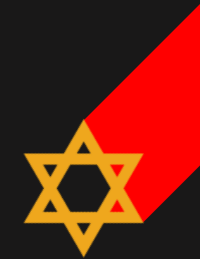Anti-Semitism in Print.
The speed with which the propaganda arrived in Latvia is one of the important questions, as yet unexplained and awaiting its historian. One would need to study the biographies of the editors and writers and to study their political backgrounds during Ulmanis's time. It is not that the Latvians lacked anti-Semites, but the question is why the Hitlerite variant got there as fast as it did. It must be remembered that Ulmanis banned anti-Semitism and therefore in 1941 there was a seven year hiatus in anti- Semitic literature. There are three aspects of Nazi propaganda that was not present in Latvia before the war in any massive way . First, the Jewish/Bolshevik tie was only minimally known. In the 1920's and 30's anti-communism was not an issue. Second, the Hitlerite biological anti-Semitism, seeing the Jews a racially polluting stock, is not present at all, and even during the occupation it played a minor role. And third and most importantly, the pre-war anti-Semitism was free of the language of the ”final solution”, such phrases as, ”the deserved punishment is coming,” ”end to the Jews”, ”final victory over Jewish domination”, ”the Jews failed to kill us but we shall not fail.” The anti-Semitism in pre-war Latvia was more concerned with the Jews as avaricious capitalists, who are taking advantage of Latvian peasants, wage-earners and the state of Latvia. The anti-Semites of Latvia saw Latvia, including Ulmanis's time, as a Jewish state, so to say, another Palestine. In terms of politics, the most persistent theme of the anti-Semites of Latvia was to see the Jews as the power behind the Parliament and the Social Democratic Party. In Latvia we can distinguish hard and soft anti-Semites. The hard ones were those who insisted on telling their ”truth” about the Jews, but they, including in part, the Pērkonkrusts, were on the fringes of political and publishing life. They were shunned by the respectable political parties and their literature consisted of small circulation, author-published pamphlets. During Ulmanis's time, anti-Semitic literature was banned altogether. However, during the Parliamentary times there was a variant of soft anti-Semitism, one of innuando, that had its counterpart in political cartoons, that figured in the polemics between the right (the parties out of power) and the center (the parties in power). The innuando consisted in the implication that the center, or more specifically its ministers, were controlled by the Jews. To what degree this variant was real anti-Semitism and to what it was a polemical weapon in political struggle is not always easy to distinguish. The Jew as synonym for capitalist has a long history, and in many countries is found still today12.
The core of Nazi anti-Semitism in Latvia was the slogan: Jew/Bolshevik, and its variant, escalated by one step, Jew/Chekist. Although the idea was not unknown in Latvia, one might find some references to it, in the 1918 period, it faded out in the 1920's and 30's. To begin with, Latvians did not use the word ”Bolshevik”, but rather a Latvian language variant ”Lielinieks”. The word Bolshevik, especially the combination Jew/Bolshevik, that instatntly also translated as Jew/Chekist, arrived in Latvia with Germans in July 1941. In fine tuning the influences of Nazism in Latvia, this iconographic difference is not without significance.
| 12 | The largest overlap between the pre-war Latvian anit-Semitism and that of Nazi occupation concerned the search for Jewish influence among the Free Masons and Rotarians. |
 EN
EN LV
LV